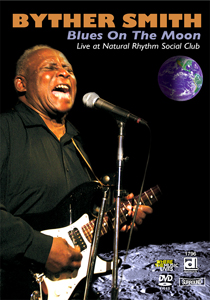Perpetratin’ The Blues

The Byther Smith, Blues On The Moon: Live At Natural Rhythm Social Club (Delmark) DVD/CD is a false document – fiction, cooked up by writer David Whiteis and the Delmark Records folks desperate to return the “negro” to his natural habitat.
Legendary guitarist/vocalist/songwriter Byther “Smitty” Smith is a blues shouter whose raw vocals are replete with gospel fervor. Throughout his career he has played it all – country, jazz, gospel, rock ‘n’ roll, and blues. He began his career as a bassist, but switched to guitar in early 1962. He honed his chops during the ’60s club scene on the South and West sides. He played Peppers Lounge with Otis Rush and Howlin’ Wolf and toured with Albert King and John Lee Hooker. At age 75, Smith is still going strong and is a highly respected elder statesman who travels extensively in Europe and enjoys a type of cult status in the United States.
The band, featuring guitarist Anthony Palmer (full disclosure: Palmer is my husband), bassist E.G. McDaniel, drummer James Carter, and keyboardist Daryl Coutts, are veteran musicians who have toured and recorded extensively with legends such as Rush, Eric Clapton, Eddy Clearwater, and Willie Kent. When they are not playing their regular gig with Jimmy Burns, they can be heard live and on CD and DVD backing Smitty, Lurrie Bell, Eddie Taylor Jr., Katherine Davis, Mr. G., Aron Burton, and Ronnie Baker Brooks.
The Natural Rhythm Private Social Club (the name over the door, though “Private” is curiously missing in the title of the DVD/CD) is not a blues club. It is housed in a small, windowless building at 59th and Damen on Chicago’s South Side. There is no stage – the film crew had to move pool tables and furniture aside in order to create space for the band, who still didn’t have much elbow room. Food was being served on the pool table behind Coutts and next to Carter so club patrons were forced to weave their way between performers, and Palmer did a fine job of ducking and dodging to avoid being hit by the bathroom door. Toward the end of the evening tipsy patrons made their way “onstage” to attempt some singing. None of this appears on the DVD, but it was a distraction for the musicians. Smith cut the long session (3 p.m. to 4 a.m.) after driving from Mississippi, where he attended the funerals of his older brother and his sister-in-law (who died unexpectedly a few days after her husband). At one point, toward the end of the night, he passed out briefly from the heat, exhaustion, or both. The band cut one more tune, and Smith called the session.
Smitty is a very physical player. I have seen him many nights at the Kingston Mines, and, when the groove hits him, his muscular frame rocks in time to the music (he is an ex-boxer), and his feet seem to leave the floor. Sadly, that aspect is missing on the DVD because there was nowhere for him to move. Meaning no disrespect to the owner and patrons of the Natural Rhythm Social Club, this is the type of place that the assembled veteran musicians were playing when they first started out and were dreaming of playing to the multitudes.
Why would Delmark put veteran musicians in this type of venue? Perhaps the answer can be found in the liner notes. In the first paragraph writer David Whiteis, who scouted the place, laments the fact African- Americans prefer the “R&B inflected amalgam of styles known variously as ‘soul-blues’ and ‘southern soul.'” “The more traditional twelve-bar blues,” he opines, “has lost its ability to capture the minds and hearts of contemporary African-American listener[s].” Knowing this, wouldn’t it have been wiser to feature Byther at his regular Chicago haunts the Kingston Mines or Buddy Guy’s Legends? Delmark artists Dave Specter, Little Arthur Duncan, Lurrie Bell, Burns, and Mississippi Heat were offered garden spots at established blues clubs like Legends, Rosa’s, and B.L.U.E.S. I sense some kind of missionary zeal here.
Carping aside, Live At Natural Rhythm Club features Smith’s signature chunky rhythmic sensibilities, minor-key guitar mastery, and impassioned, gritty vocals. Smith has penned seven original tunes with themes ranging from the sacred to the profane (both are touched upon in “Love Of Honor,” where Byther sings, “Baby Jesus died” to “Lord I’m telling you all you people, don’t you ever make me mad/Well it give me the right to break your jaw with a left and right”), love, and longing. The title track is a quirky jam that blends the groove from Coltrane’s “A Love Supreme” with some spare blues guitar and surrealistic lyrics: “I’m telling all my friends out there/you people all say Smitty’s lyin’ . . . I received $5 million/to play the blues standing on the moon/When I reach my destination/I’ll play the blues standing on the moon/I’ll play the beautiful melody/for the angels in heaven above.” “Monticello” (Smith is from Monticello, Mississippi) is an intensely moving minor-key blues about loneliness and lost love. One of nine children, his mother died during childbirth when he was a year old, and his father died shortly after.
Fans of Theresa’s and the original Checkerboard Lounge should stick to the DVD on this one. The ambience is reminiscent of these two legendary South Side clubs, though minus the raucous energy and give-and-take between patrons and musicians. Fans, who eschew preconceived notions about the blues, might prefer to groove with their iPods and imagine their own scenario.
– Beverly Zeldin-Palmer
Category: Columns, Monthly, Sweet Home












Smith is great! Wonderfoul cd,and good post for have infos on Byter’s life.
Bye
Once again,Ms.Z.Palmer has hit the nail right on the head…Please keep telling it like it is,B! james